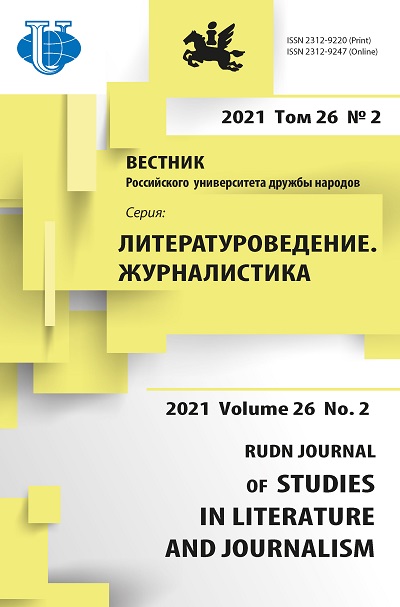Медиакультура как феномен информационной эпохи
- Авторы: Славина В.А.1, Солдаткина Я.В.1
-
Учреждения:
- Московский педагогический государственный университет
- Выпуск: Том 26, № 2 (2021)
- Страницы: 286-293
- Раздел: Журналистика
- URL: https://journals.rudn.ru/literary-criticism/article/view/26944
- DOI: https://doi.org/10.22363/2312-9220-2021-26-2-286-293
- ID: 26944
Цитировать
Полный текст
Аннотация
Поднимаются проблемы научной рецепции такого феномена, как медиакультура. Авторы предлагают свою трактовку медиакультуры как особого вида культуры информационного общества в самом широком проявлении и понимании этого явления. Рассматриваются исходные для медиакультуры понятия «медиа» и «культура», устанавливается их функциональное соответствие. Для современного этапа развития медиа характерно соединение коммуникационных и информационных интенций: классических СМИ и средств массовой коммуникации, включающих в себя новые медиа, блоги, социальные сети, а также дигитальные копии несетевых артефактов и их сетевые модификации. Конечный результат этих медиакоммуникаций - медиатекст в самой широкой интерпретации этого понятия. Согласно предлагаемой концепции, современная медиакультура реализует себя в двух основных аспектах. В прикладном значении медиакультура - это форма репрезентации и дигитализации классических и сетевых культурных единиц. В глобальном смысле медиакультура понимается как эстетико-аксиологическая сфера жизни общества, в которой культура объединяет ценностное и художественное наследие, использующее инфомационно-коммуникационные каналы медиа для своей репрезентации в политике, образовании и собственно культуре.
Ключевые слова
Об авторах
Валентина Александровна Славина
Московский педагогический государственный университет
Автор, ответственный за переписку.
Email: yav.soldatkina@mpgu.su
доктор филологических наук, профессор, заведующая, кафедра журналистики и медиакоммуникаций, Институт журналистики, коммуникаций и медиаобразования
Российская Федерация, 119991, Москва, ул. Малая Пироговская, д. 1Янина Викторовна Солдаткина
Московский педагогический государственный университет
Email: yav.soldatkina@mpgu.su
доктор филологических наук, доцент, профессор, кафедра журналистики и медиакоммуникаций, Институт журналистики, коммуникаций и медиаобразования
Российская Федерация, 119991, Москва, ул. Малая Пироговская, д. 1Список литературы
- Кириллова Н.Б. От медиакультуры к медиалогии // Культурологический журнал, 2011. № 4 (6). URL: http://cr-journal.ru/rus/journals/98.html&j_id=8 (дата обращения 11.01.2021).
- Маклюэн Г.М. Понимание медиа: внешние расширения человека. М.: Кучково поле, 2017. 464 с.
- Кирия И.В., Новикова А.А. История и теория медиа. М.: Изд. дом Высшей школы экономики, 2017. 423 с.
- Солдаткина Я.В. Современный медиатекст: культурологические и функциональные свойства // Журналистика в контексте времени: коллективная монография / под ред. Т.Н. Владимировой, В.А. Славиной, Н.В. Кодола. М.: МПГУ, 2020. С. 33-51.
- Кириллова Н.Б. Медиалогия как синтез наук. М.: Академический проект, 2013. 366 с.
- Цицерон Марк Туллий. Избранные сочинения. М.: Художественная литература, 1975. 456 с.
- Лотман Ю.М. Беседы о русской культуре. СПб.: Искусство-СПБ, 1994. 481 с.
- Лотман Ю.М. Семиосфера. СПб.: Искусство-СПБ, 2000. 704 с.
- Новиков В.И. Литературные медиаперсоны XX века: личность писателя в литературном процессе и в медийном пространстве. М.: Аспект Пресс, 2017. 240 с.
Дополнительные файлы















